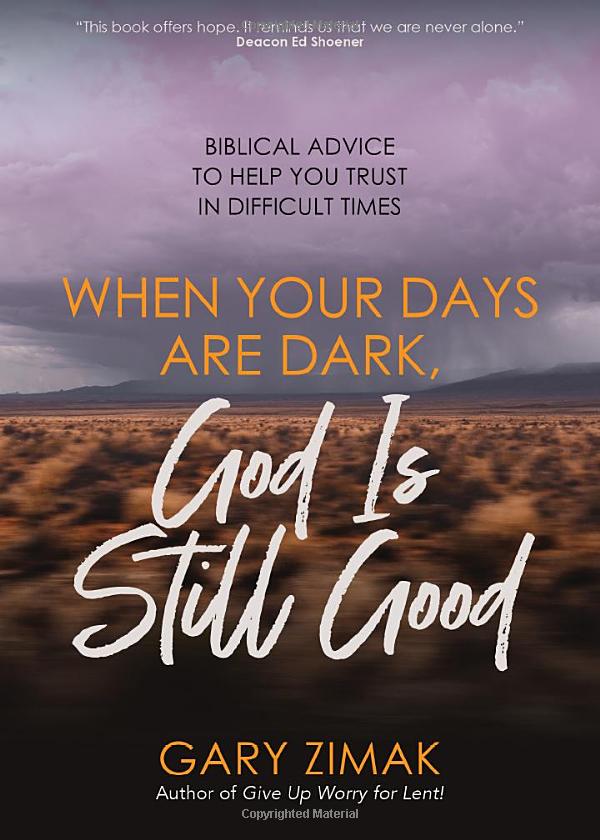
Book review: ‘When Your Days are Dark, God is Still Good’
“When Your Days are Dark, God is Still Good.” By Gary Zimak. Indiana: Ave Maria Press, 2023. 160 pages. Paperback: $15.95; Kindle: $11.99.
One of the first and most important things to mention about Gary Zimak’s new book, “When Your Days are Dark, God is Still Good,” is that he steers clear of platitudes and any other kind of Pollyanna attitudes. Without diminishing the real weight of human suffering, he nonetheless provides a source of comfort and hope that goes beyond the usual “feel-good” offering.
I first encountered Zimak a number of years ago when I was contemplating the best way to observe Lent. Though there are the usual suspects when it comes to giving things up (think candy, soda, chocolate – you know what I mean) I was looking for something that would result in – or at least begin to move toward – a more permanent and positive change in my life. That’s when I discovered his book “Give up Worry for Lent.” Based on my experience with that book, I was looking forward to seeing what he would say in this one.
He begins by talking about what the book isn’t. It isn’t about ferreting out “silver linings,” although it is a book about hope, and he doesn’t try to answer the question “Why?” because, as he points out quite correctly, “none of us knows for sure why God does what he does.” What the author does do is try to get to the point St. Paul reached when he wrote in his letter to the Romans, “We know that in everything God works for good with those who love him, who are called according to his purpose” (Ro 8:28).
Zimak immediately cautions against seeing the above phrase primarily as something nice posted to Facebook or printed on a pretty wall hanging. “It may sound good to many, but not to someone who just suffered a devastating loss,” he says. “That individual needs something more. … They need proof that these words are true.”
The proof he goes on to offer also comes from scripture, using the real stories of real people who have experienced “seemingly horrendous situations” and for whom “a constant theme will emerge: God really can bring good out of anything.”
Some of the stories he includes are familiar ones – Adam and Eve, Lazarus, St. Paul, the Apostles in the Upper Room, and Job. Others may be less familiar, such as the Old Testament story of Joseph, or Ruth and Naomi, or Hagar. In each instance, the story has been chosen because it deals with some of the most difficult situations that human beings face in their journeys through life. From mistakes we make, to when others treat us badly, to rejection, fear, great loss and when things just don’t make sense, all of these people found that God can manage to bring good things from what initially appears to be quite awful.
And while Zimak shows that God does indeed “write straight with crooked lines,” there are a few caveats to keep in mind. The first is that God’s time is not our time, and the solution to our dilemmas may not appear right away. “It typically takes some time,” he says. “I encourage you to keep looking, as God often works in very small and subtle ways.
The other thing to bear in mind is that the solution we envision may not be the one that is part of God’s plan. “It’s a difficult lesson to learn, but our carefully constructed dreams aren’t always good for us,” he continues. “Fortunately, we have a heavenly Father who knows what is good for us.”
And finally, as the story of Job tells us, sometimes the only answer when nothing else makes sense is trust. “The only time we can choose this path of unconditional trust is when we are so immersed in darkness that we must operate solely on faith,” Zimak concludes. “God is offering you what he offered Job: a chance to trust him in a radical way.”
Author bio:
Gary Zimak is a Catholic speaker and the bestselling author of a number of books including “Give Up Worry for Lent” and “Let Go of Your Fear.” He served as director of parish services at Mary, Mother of the Redeemer Catholic Church in North Wales, Pennsylvania, and is a speaker and retreat leader at Catholic parishes and conferences throughout the country. He lives in Mount Laurel, New Jersey, with his wife; they have two children.

